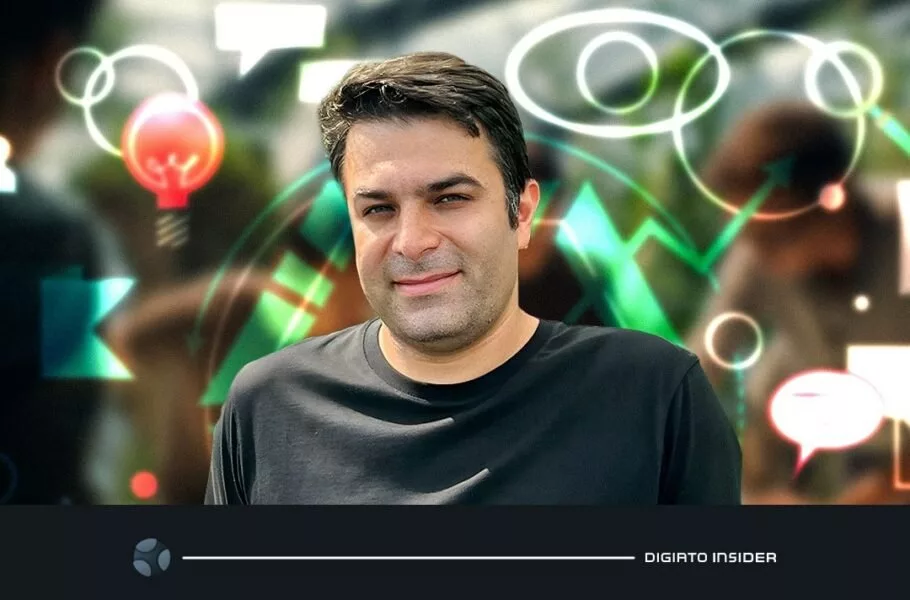
Startup Founder Exodus: Growth or Crisis? Azki Sarmayeh CEO Weighs In
Over the past year, some founders of Iran's major digital economy companies have divested their shares.
Lately, news of farewells has been circulating in Iran's startup ecosystem. Over the past year, some founders of the country's major digital economy companies have divested their shares – an event that has worried some activists in this field. Reza Khanaki, CEO of Azki Sarmayeh and an active investor, believes that the current operating conditions in the country play a more significant role than the ecosystem's growth and maturity in these decisions. One of his reasons is the lower returns for founders from selling their companies compared to global examples.
According to a Digiato report, the three founders of Tapsi sold all their shares last year, and the two founders of Ap did the same a few days ago. Add to this list the numerous exits of Sarava from the ecosystem and the sale of a portion of Digikala's shares to Hamrahe Aval.
These sales, while perhaps relatively high in terms of Iranian currency, are not very significant in dollar terms. According to information published on the Codal system and the Farabours organization's website, the value of the shares sold by the three Tapsi founders in February of last year was close to \$9.39 million. The two founders of Asan Pardakht Persian (Ap) each sold their shares to Shahr Bank for approximately \$25 million.
A Look at Global Experiences: From Twitter to Instagram
Founders' exits are not unprecedented in the world of startups. In mature ecosystems, this is considered part of the natural cycle of company growth. For example, during the sale of Twitter to Elon Musk, Jack Dorsey, the platform's co-founder, also sold his shares. Kevin Systrom, one of Instagram's co-founders, also divested his shares in 2012 during the sale of the social network to Facebook. However, he remained the executive manager of Instagram until 2018 and left the company due to disagreements with Mark Zuckerberg, CEO of Meta. The same thing happened to Milad Monshipour, the founder of Tapsi.
There are also many Middle Eastern examples of these sales. For instance, Uber acquired Careem for $3 billion.

Challenges of Entrepreneurship in the Current Climate
This wave of founders exiting Iranian startups and digital economy businesses has garnered significant attention. Some experts see this trend as a sign of the country's innovation ecosystem maturing, leading to positive developments, as successful exits by founders increase hope and motivation for newcomers to the ecosystem and create a sustainable growth cycle in this field.
Others view this as a warning bell for the future of entrepreneurship in Iran. Currently, few Iranian entrepreneurs seem satisfied with the path they have started. Sanctions, currency fluctuations, brain drain, and challenges from governmental bodies such as regulators or the tax organization have stifled businesses.
The fate of cryptocurrency exchanges, whose Rial payment gateways have been blocked for over two months due to the Central Bank's decision, exemplifies this.
Some experts believe that private economic actors do not foresee a rapid improvement in the country's conditions, or that pressure from quasi-governmental entities has led to their exit from the ecosystem. Concerns also escalate when the result of this exodus is the founders' migration to other countries. In this scenario, the innovation ecosystem loses not only their capital but also their years of experience.
Founders' Exit Figures: Not Very Significant in Dollar Terms
Reza Khanaki, CEO of Azki Sarmayeh and an active investor, in an interview with Digiato, analyzes this trend and examines ways to overcome these conditions. Khanaki believes that no single factor can be solely responsible for the accelerating departure of founders. He tells Digiato:
"Part of it relates to the country's conditions, and part to the maturity of startups. I give more weight to the impact of the country's conditions because, fundamentally, the exit figures for founders are not very significant compared to global startups. When a founder decides to exit, they expect to gain substantial wealth. The Ap founders only gained $25 million after all these years, and regarding Tapsi, the founders' returns did not indicate significant commercial success. It cannot be denied that we are at a stage where businesses have grown to the point of seeking new investors, and the founders are exiting."
Referring to global experiences, he says that even in developed countries, most founders of successful startups have remained in their companies. Khanaki points to the example of Apple and Steve Jobs, who, despite a temporary separation, returned to the company.
Serious Challenge: Shortage of Skilled Professionals for Replacement
According to this investor, what makes this issue more prominent in Iran is the limited experience in such cycles and the shortage of skilled human resources for replacement. Khanaki explains: "In Iran, if a founder leaves a business, there are a limited number of replacement teams or qualified individuals to manage it, unlike, for example, the United States, which is full of skilled professionals. This can be concerning."
Over the past year, we have observed that the capital resulting from the exit of founders and investors has not returned to the ecosystem. Could this mean these individuals are unwilling to engage in entrepreneurship in Iran? Khanaki believes it is too early to judge and answer this question. Pointing out that some of these individuals' capital is still involved in startups, he believes it is natural for some of this money to be spent on improving the living conditions of business founders. However, it is heard that one of the Tapsi founders is busy planning to launch a new business.
In response to Digiato's question about his outlook on the future of the startup ecosystem, Khanaki said:
"The first wave of Iranian startups has formed and matured, and from now on, we need to be cautious about what business is considered a startup and technology-driven. I think this change in approach is also being discussed globally. It is not very likely that new startup businesses will emerge like the startups of the past two decades."
He emphasizes that changing the general conditions of the country plays a significant role in the future of the ecosystem. Most are waiting to see this change in the country's conditions and then enter this field; the current risks are so high that everyone is talking about the future cautiously.

Going Public: A Key Solution for Strengthening the Ecosystem
This investor believes that the key solution for strengthening the innovation ecosystem is the development of the capital market. Emphasizing the importance of startups going public, he says: "Almost everyone who has become wealthy in the global innovation ecosystem has had their wealth come from the initial public offering of their startup on the stock exchange, from Tesla and Elon Musk to Facebook and Zuckerberg."
The real-time valuation of these founders' assets through their stock prices on the stock exchange leads news outlets to cover them more, and these success stories are formed. He believes that facilitating the conditions for Iranian innovative businesses to go public and offering their shares in the capital market has a significant impact on investors' interest in this field, because other investors, seeing the multiple-fold growth in these businesses' revenues, become interested in operating in this area. Khanaki tells Digiato in this regard:
"The stock market is a risk exchange market. When investors see, for example, an artificial intelligence startup listed on the stock exchange and its revenue multiplies many times in less than two or three years, they are motivated to develop artificial intelligence companies, list them on the stock exchange, and profit. This is one of the functions of the stock market."
This investor considers the issue of valuation to be one of the obstacles to attracting capital by the startup ecosystem, a problem that is solved by offering shares on the stock exchange: "When valuation is real-time on the stock exchange, startups are no longer involved in the valuation issue. Currently, when a startup is valued, business conditions may change, and the company needs revaluation."
Of course, the disclosure of the revenue and valuation of startups has usually been met with negative reactions from investment activists, who do not consider these numbers significant. Khanaki, confirming this, tells Digiato that the solution to this is also for businesses to go public, which leads to the determination of their fair value, and if there is a wrong estimate, it is quickly corrected. He gives the example of Tapsi, which, despite disagreements in the initial valuation, now has a much higher value on the stock exchange than predictions.

Mergers and Acquisitions: A Possibly More Attractive Path Than IPO
However, he emphasizes that it should not be assumed that the shares of all startups should be offered on the stock exchange; rather, for many businesses, mergers and acquisitions are a better option – an event that has happened many times around the world. Most transactions that take place globally are M&A (Merger and Acquisition), where startups are placed within larger businesses, such as Instagram being bought by Facebook or businesses that Google, Microsoft, and Apple buy and integrate as a new service into their own businesses.
An event that Khanaki believes is not only not bad but perhaps a better and more interesting option for entrepreneurs than an IPO. The example of Cafe Bazaar occurred, and although Hezar Dastan Group finally obtained a listing permit for this company on the stock exchange after four years, before the symbol was listed and the initial offering, it transferred all its shares to Tapsel Company.
The wave of founders exiting Iranian startups cannot be explained by a single factor. Although this phenomenon can be a sign of ecosystem maturity, the country's conditions and existing challenges also play a significant role. However, solutions such as facilitating the entry of startups into the stock market can help maintain the dynamism of the startup ecosystem – a path that, of course, requires the cooperation of policymakers and the improvement of the overall business environment in the country.












